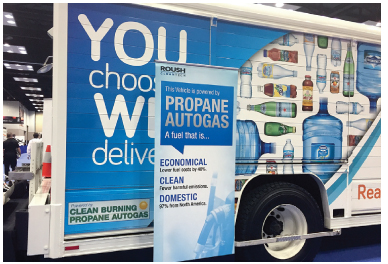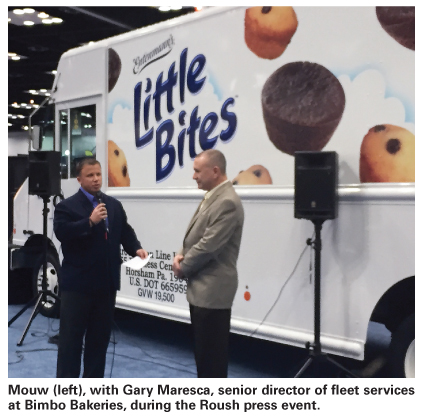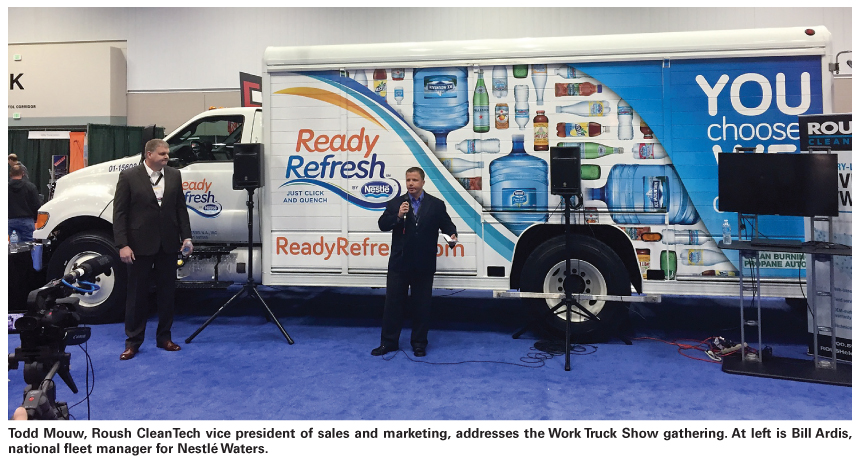Monday, April 11, 2016
During back-to-back press conferences at the NTEA Work Truck Show in Indianapolis in early March, Nestlé Waters and Bimbo Bakeries unveiled plans for the addition of new propane vehicles to their fleets. Spokesmen from both companies noted the environmental benefits of propane, in addition to the cost savings. 
Environmental stewardship is just one reason Nestlé Waters North America is adding more than 150 medium-duty beverage delivery trucks fueled by propane autogas—but it’s a big motivation. Over the vehicles’ lifetime, the 155 Ford F-650 trucks will reduce carbon dioxide emissions by more than 24.6 million pounds. The new units are being deployed this month. Nestlé propane trucks make deliveries to customers across the country, including Los Angeles; San Francisco; Washington, D.C.; Milwaukee, Wis.; and Fort Lauderdale, Fla. Deployments in 2016 will include New York City, Boston, Dallas, Houston, Chicago, Philadelphia, and Baltimore.
“Becoming a better steward of our environment is a priority for Nestlé Waters,” said Bill Ardis, national fleet manager, speaking at the NTEA Work Truck Show. “We’ve been running propane autogas vehicles since 2014. Because of the proven emissions reductions and cost savings, we knew it was the right choice.”
The new medium-duty delivery trucks, added to the company’s existing autogas fleet of 30 Ford trucks of the same model, will also help the company save on maintenance and fuel costs. “Autogas allows us to operate without compromising standard delivery methods and reduce operational costs,” Ardis said. Propane autogas costs the company an average of $1 per gallon versus diesel. Each delivery truck is equipped with a California Air Resources Board- and Environmental Protection Agency-compliant Roush CleanTech autogas fuel system with a 45-usable-gallon fuel tank. Mickey Body in High Point, N.C. upfitted the vehicles with side-load beverage bays. “Fueling beverage delivery trucks with propane autogas offers the best total cost of ownership,” said Todd Mouw, Roush CleanTech’s vice president of sales and marketing.
Bimbo Bakeries USA (Horsham, Pa.) is delivering its bread and baked goods in vehicles fueled by emissions-reducing propane autogas. The company’s 84 new Ford F-59 trucks, equipped with Roush CleanTech fuel technology, operate in three of the company’s major markets. “Bimbo Bakeries USA introduced propane autogas vehicles into our Chicago, Denver, and Washington, D.C. regions to help accomplish our corporate environmental goals while lowering our bottom line,” said Gary Maresca, senior director of fleet services at Bimbo. “This initiative is the latest in our company’s continued effort to reduce our carbon footprint.”
Each new autogas-fueled delivery truck will cut carbon dioxide emissions by about 192,000 pounds compared to gasoline, or 16.1 million fewer pounds over the lifetime of the fleet. In January, 30 units began operating from Bimbo’s Chicago-area location, and 27 began operating from the Denver office. The remaining 27 units that will serve the Washington, D.C. region began deliveries in March. The alternative fuel trucks serve as route vehicles, delivering Bimbo Bakeries’ products such as Thomas’, Oroweat, Entenmann’s and Sara Lee to retail locations.
“Bimbo Bakeries seamlessly integrated our fuel system technology into three of its key markets,” said Todd Mouw, Roush CleanTech vice president of sales and marketing. “We helped train their technicians on the specifics of servicing our propane autogas Ford F-59 trucks.” Bimbo Bakeries installed on-site fueling stations at each location, eliminating the need to refill at retail stations. Maresca expects to see a reduction in operational costs, as well as maintenance savings due to the cleaner-burning properties of the fuel. Currently, the company pays about $1.30 per gallon of propane autogas compared to $1.80 for gasoline. This cost rolls in the expense of the refueling infrastructure. Bimbo tapped incentives in both Colorado and Maryland to minimize the initial costs associated with alternative fuel technologies.
“Whenever an established industry leader like Bimbo Bakeries USA chooses to operate a large fleet of delivery vehicles with propane autogas over other fuel options, it’s a big deal,” said Tucker Perkins (above), chief business development officer at the Propane Education & Research Council.

Environmental stewardship is just one reason Nestlé Waters North America is adding more than 150 medium-duty beverage delivery trucks fueled by propane autogas—but it’s a big motivation. Over the vehicles’ lifetime, the 155 Ford F-650 trucks will reduce carbon dioxide emissions by more than 24.6 million pounds. The new units are being deployed this month. Nestlé propane trucks make deliveries to customers across the country, including Los Angeles; San Francisco; Washington, D.C.; Milwaukee, Wis.; and Fort Lauderdale, Fla. Deployments in 2016 will include New York City, Boston, Dallas, Houston, Chicago, Philadelphia, and Baltimore.
“Becoming a better steward of our environment is a priority for Nestlé Waters,” said Bill Ardis, national fleet manager, speaking at the NTEA Work Truck Show. “We’ve been running propane autogas vehicles since 2014. Because of the proven emissions reductions and cost savings, we knew it was the right choice.”

The new medium-duty delivery trucks, added to the company’s existing autogas fleet of 30 Ford trucks of the same model, will also help the company save on maintenance and fuel costs. “Autogas allows us to operate without compromising standard delivery methods and reduce operational costs,” Ardis said. Propane autogas costs the company an average of $1 per gallon versus diesel. Each delivery truck is equipped with a California Air Resources Board- and Environmental Protection Agency-compliant Roush CleanTech autogas fuel system with a 45-usable-gallon fuel tank. Mickey Body in High Point, N.C. upfitted the vehicles with side-load beverage bays. “Fueling beverage delivery trucks with propane autogas offers the best total cost of ownership,” said Todd Mouw, Roush CleanTech’s vice president of sales and marketing.
Bimbo Bakeries USA (Horsham, Pa.) is delivering its bread and baked goods in vehicles fueled by emissions-reducing propane autogas. The company’s 84 new Ford F-59 trucks, equipped with Roush CleanTech fuel technology, operate in three of the company’s major markets. “Bimbo Bakeries USA introduced propane autogas vehicles into our Chicago, Denver, and Washington, D.C. regions to help accomplish our corporate environmental goals while lowering our bottom line,” said Gary Maresca, senior director of fleet services at Bimbo. “This initiative is the latest in our company’s continued effort to reduce our carbon footprint.”
Each new autogas-fueled delivery truck will cut carbon dioxide emissions by about 192,000 pounds compared to gasoline, or 16.1 million fewer pounds over the lifetime of the fleet. In January, 30 units began operating from Bimbo’s Chicago-area location, and 27 began operating from the Denver office. The remaining 27 units that will serve the Washington, D.C. region began deliveries in March. The alternative fuel trucks serve as route vehicles, delivering Bimbo Bakeries’ products such as Thomas’, Oroweat, Entenmann’s and Sara Lee to retail locations.

“Bimbo Bakeries seamlessly integrated our fuel system technology into three of its key markets,” said Todd Mouw, Roush CleanTech vice president of sales and marketing. “We helped train their technicians on the specifics of servicing our propane autogas Ford F-59 trucks.” Bimbo Bakeries installed on-site fueling stations at each location, eliminating the need to refill at retail stations. Maresca expects to see a reduction in operational costs, as well as maintenance savings due to the cleaner-burning properties of the fuel. Currently, the company pays about $1.30 per gallon of propane autogas compared to $1.80 for gasoline. This cost rolls in the expense of the refueling infrastructure. Bimbo tapped incentives in both Colorado and Maryland to minimize the initial costs associated with alternative fuel technologies.
“Whenever an established industry leader like Bimbo Bakeries USA chooses to operate a large fleet of delivery vehicles with propane autogas over other fuel options, it’s a big deal,” said Tucker Perkins (above), chief business development officer at the Propane Education & Research Council.

